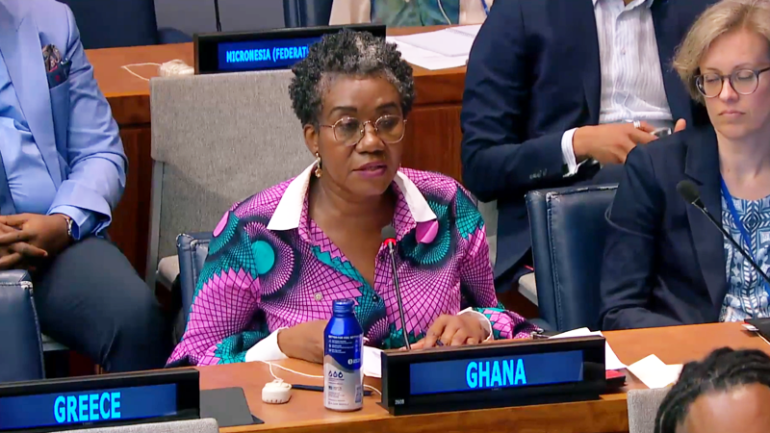57th Session of the Commission on Population and Development, CPD57

- Posted by admin
- Posted in News, Statement & Remarks, UN News
Dr. Leticia Adelaide Appiah,
Executive Director,
National Population Council
United Nations, New York
April 29, 2024
Mr. President,
Excellencies,
Distinguished delegates
Ladies and Gentlemen,
Three decades ago, in Cairo, we redefined the links between population and development and emphasized the imperative for the protection of individual human rights as well as reproductive health and rights to be at the heart of the population and development discourse and programmes. Thirty years on, we look back with satisfaction on the significant progress that has been realized and must renew our commitment to accomplish the achievement of the objectives that are still required to realise the agenda set out in 1994.
Mindful of the interconnected and cross-border challenges of our contemporary era, as well as the crises of COVID-19 pandemic, conflicts, and climate change, we must work together to address the emerging realities that have rolled back the gains that were being made in both the ICPD and SDGs.
We urge all countries to work together across borders and all other divides to uphold the tenets of the ICPD PoA and to ensure much needed investments that will accelerate the achievement of the Sustainable Development Goals and finance the ICPD PoA. Action is also urgently required to relieve many of the developing countries that have been pushed into debt distress, with ever-dwindling fiscal space for mobilising domestic resources to finance the ICPD Plan of Action.
Excellencies, Ladies and Gentlemen,
As an African developing country, Ghana has since its independence remained cognisant of the important relationship between population and development, a factor that led us to develop by1969 a population policy, one of the first West Africa countries to do so.
We have remained committed to sharing our national expertise and contributing to global policies in this area. No doubt, many of you who have been in this domain for long, would be familiar with the contribution of one of my predecessors, Professor T. Sai to women’s sexual and reproductive health rights, and especially for his role as the Chair of the Main Committee of the 1994 International Conference on Population and Development (ICPD) as well as his enduring commitment to the Agenda as was exemplified during the 25th year Review in Nairobi, in 2014.
On reproductive health, Ghana has over the past decades, widened access to sexual reproductive health and information and services, including family planning. This has led to a decline in maternal mortality ratios, total fertility rates and population growth rates and an increase in life expectancy albeit slowly.
On women in leadership, the percentage of women in the national parliament increased from 8% in 1992 to 14.5% in 2021 and we expect that the Affirmative Action Bill which is under consideration in Parliament would help significantly improve the overall levels of representation. Child protection remains an important area of focus for the government of Ghana. While Ghana is yet to achieve a complete eradication of the harmful practice of child marriages, the incidence are fast reducing.
In addition, the Child Labour Unit of the Ministry of Employment and Labour Relations has with the support of partners and the ILO worked on reducing the incidence of Child Labour in all its exploitative forms. The country continues to pay particular attention to the wellbeing of children and has ensured free education to guarantee access for all. The country has progressed from its Free Compulsory Basic Education policy to a Free Senior High School policy that guarantees an opportunity to education for all up to the senior high school level highlighting the importance we attach to human capital development through education and skills training. Technical and vocational education and training has been enhanced in order to provide relevant skill-sets to address the challenges of unemployment, the need for decent jobs, and the income expectations of the growing youthful population.
Excellencies,
In seeking to address inequalities within the society, the government of Ghana, through the Ministry of Local Government and Rural Development, has been implementing a number of climate change-resilient strategies to enhance inclusion, decent work, climate action, and resilience-building in affected communities and cities in the country.
Climate resilience intervention has supported people in worst-affected areas aimed at redressing the disproportionate effects of climate change on women and men. This support has empowered targeted families with sufficient resources to support their children’s wellbeing . Sixty percent of beneficiaries of the intervention have been women. Sustainable livelihoods as we know contributes to reduction of early and unwanted pregnancies.
To address threats of violent extremism, the government of Ghana has been working with development partners and NGOs in building the capacities and resilience of young people through education, employment and decent livelihoods in our quest to reaping the demographic dividend.
Despite the successes, avoidable barriers towards finishing the unfinished business still exist in the areas of child marriage, teen motherhood, unmet need for family planning, women’s health and nutrition, and women’s economic empowerment. The National Population Council, the UN agencies and development partners working with other agencies and concerned NGOs have actively taken up the evidence-driven approach to enhance education, advocacy, and the need for continuous action to implement the Plan of Action and the SDGs.
In conclusion, Ghana reaffirms its commitment to ICPD and its principles and calls on all countries to unite around a renewed dedication to accelerating the implementation of the Programme of Action and the Sustainable Development Goals, ensuring that none is left behind.
I thank you for your attention.
